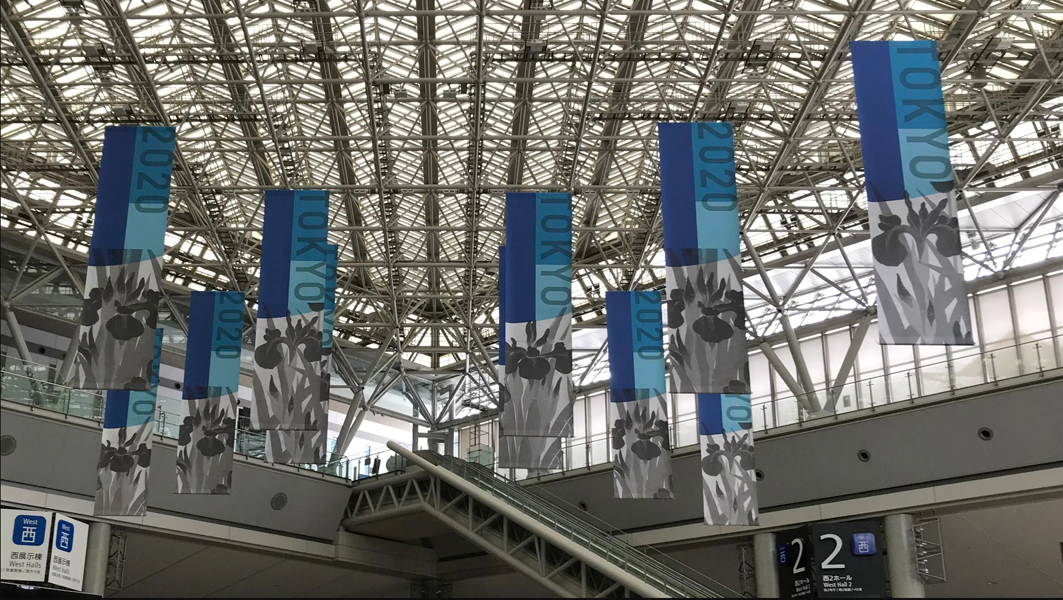Dow set to inspire Japanese schoolchildren through Tokyo 2020 banner recycling project

24 Nov 2021 – In total, 100 schools and kindergartens in the Kōtō district in Tokyo and Higashi-Matsushima city in Miyagi Prefecture are set to receive commemorative flowerpots marking the Olympic Games Tokyo 2020 as part of a legacy project by Worldwide Olympic Partner Dow. This project is a good example of a solution to improve the sustainability of look and signage materials in the events sector.
The flowerpots have been made from recycled banners that were used during the Games, as part of a pilot project to test a more sustainable solution for temporary decoration and signage. This project involved the production of 47 banners manufactured with a polyolefin-based fabric created on purpose by local company Toppan, using Dow’s soft and tough elastomer technology. Because only one type of plastic is used to produce the fabric, recyclability is improved, especially when compared to commonly used fabrics made of multiple plastics.
“We can ensure events like the Olympic Games have the necessary signage and decorations without increasing the amount of waste generated. Dow’s collaboration with Toppan is a great example of the long-term impact that Dow’s materials science expertise combined with our customers’ market and product insights can have,” explained Hirokazu Shibata, Technology Leader, Dow Japan. “Together, we developed this polyolefin-based fabric especially for Tokyo 2020 to address the growing need to give plastic a second life. Beyond materials, it’s an honour to engage with the municipalities of Japan’s Kōtō district and Higashi-Matsushima, who share our commitment to a sustainable future and to leaving a legacy by educating the next generation of schoolchildren.”
With event banners often being incinerated or going into landfill after use, the recyclable material created by Dow helped address the environmental goals of the Olympic Games Tokyo 2020, resulting in approximately 30-35 per cent fewer greenhouse gas emissions* over the product lifecycle compared with incinerated conventional banners.
“Look and signage are essential to bring colour to an event and engage participants, but can also be a major source of waste,” said Marie Sallois, Director of Corporate and Sustainable Development at the International Olympic Committee (IOC). “This pilot project is a great example of collaboration between Olympic partners to showcase sustainable innovation at the Games, while putting into practice the IOC’s best practice recommendations for the lifecycle management of branding and signage materials. The project will bring valuable learnings to help the events industry design more sustainable look and signage solutions, thereby contributing to reducing the environmental footprint of events.”
The new, fully recyclable banners could be seen throughout the Games in venues such as the Olympic Village, the International Broadcasting Centre and the Main Press Centre. After the Closing Ceremony, these were then collected and turned into more than 1,600 flowerpots to be distributed to a total of 89 schools and kindergartens in Tokyo’s Kōtō district, which was home to many of the Games venues, and 11 schools in the city of Higashi-Matsushima, Miyagi Prefecture, which was severely damaged by the 2011 earthquake that struck eastern Japan.
Each flowerpot features a commemorative message to remind schoolchildren of the Olympic Games Tokyo 2020, while educational material about the project and the importance of recycling will be also distributed to each school.
Within Higashi-Matsushima, children at the Miyanomori Elementary School will be using the flowerpots to grow saplings to help restore local wetlands and forests that were affected by the 2011 earthquake. The so-called “School in the Forest” is playing a key role in recovery efforts to revive the devastated woodland by engaging its students and the local community in regeneration projects.
By contributing to these efforts and inspiring schoolchildren within Higashi-Matsushima and Kōtō, Dow’s recyclable banner project is delivering results long after the Games, helping to leave a positive legacy and highlighting the need to design products with recyclability in mind. It is hoped the project can also present a model that can help accelerate the implementation of more sustainable solutions for look and signage in the events sector.
* Verified by Tokyo City University





